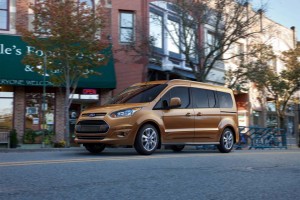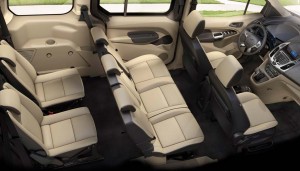Ford has had a troubled history when it comes to minivans – first rejecting the design that instead became Chrysler’s industry game-changing Voyager and Caravan models, then fielding a fleet of me-too designs that never caught on with consumers.
Now, after being out of the segment for a half-decade Ford is making its return with a 7-passenger version of its European van dubbed the Transit Connect Wagon. It will provide a more traditional, van-like alternative to Ford’s bigger “people-mover,” the Flex.
“Transit Connect Wagon gives young families and people on the go the fun-to-drive and efficient vehicle they’ve been looking for,” said Mark Fields, recently named Ford’s new Chief Operating Officer and the outgoing Ford President of the Americas. “It’s an all-new, smaller seven-seater that has better mileage than larger vans and creates a segment of its own. Customers also will love the unique combination of style, adaptability and affordability this wagon brings.”
The Transit Connect has been offered in the U.S. market for several years but until now, the focus has been on commercial and fleet users, rather than on retail buyers. The personal use market becomes a major target as Ford rolls out an all-new update of the Transit Connect previewed several months ago at a company-wide product event in Amsterdam. European buyers have had the option of buying a van-like Transit Connect called the Tourneo.
The Transit Connect Wagon will be offered with two powertrain options:
- A 2.5-liter inline-four; or
- A 1.6-liter EcoBoost I-4 expected to deliver better than 30 mpg on the Highway, making it the minivan segment leader in fuel economy.
The Transit Connect Wagon will be offered in both short, 5-passenger and extended wheelbase 7-passenger configurations. The maker says payload capacity will be up to 1,200 pounds with a maximum 100 cubic feet of cargo space. Towing capacity will max out at 2,000 pounds – 500 more, notes Ford, than an I-4 version of the Toyota Highlander.
Optional features will include large, panoramic glass roof, rearview camera, Sync infotainment system and onboard navigation,
As for safety technology, there will be the usual, federally mandated brake-based systems such as ABS and electronic stability control while, Ford notes, it will also feature first-row frontal, pelvis and side airbags, with first-, second- and third-row side curtain airbags in long-wheelbase models. Short-wheelbase versions get first- and second-row side curtain airbags.
Significantly, the Transit Connect Wagon will feature classic minivan-style sliding rear doors. That’s a big shift back to one of the features that conventional minivan buyers have loved – but which also became a symbol of derision for those who wrote off the functional, boxy vehicles.
Minivans have had a meteoric rise and fall over the last three decades, U.S. sales surging to a nearly two million unit peak after Chrysler introduced the first truly modern minivans in 1984. Those vehicles actually were conceived by product chief Hal Sperlich while he worked for Ford but the bigger maker’s bean-counters rejected the idea. Sperlich followed former boss Lee Iacocca to Chrysler which put his concept into production.
Ford – like many competitors – struggled to strike back, the Dearborn, Michigan-based maker coming up with a variety of alternatives including the Windstar, the Freestar and others. With sales going nowhere but down, the last true Ford minivan was pulled from production in 2007.
It was replaced by the Ford Flex, a wagon on steroids that notably did not feature sliding doors. Ford has had moderate success with Flex but has been looking for a more traditional alternative for younger, less affluent buyers.
The breakthrough came with Ford CEO Alan Mulally’s One Ford strategy which emphasizes sharing vehicle platforms around the world rather than developing unique products for individual models. The commercial version of the European-designed Transit Connect was one of the first models to go global and has moderate success in the States, sales of the old version now running about 35,000 annually.
The maker clearly hopes to increase that with the introduction of the Tourneo-based Transit Connect Wagon which, like the commercial van, will be imported from Spain.
It remains to be seen how buyers will react. The minivan segment continues to decline and is barely running at a third of its peak volume. General Motors remains out of the market and Chrysler will soon abandon one of its two remaining models, the Town & Country, leaving only its Dodge Caravan, the Toyota Sienna, Honda Odyssey and Nissan Quest as serious alternatives in the downsized minivan market.



Though a bulky, forward-tipping second seat makes the North American-spec interior far less-versatile than the European one, the current Transit Connect may well be my favorite U.S. Ford offering, as it’s got huge windows – almost a “hearse style” driving position with that low cowl and tall windshield! – usefully big door openings and a uniquely utilitarian flavor with its hose-off flooring and sturdy rear leaf springs. So long as the interior adds some practicality-enhancing touches like a fold-flat front seat or a hard security cover at beltine level, I’m actually not keen on the next-generation Transit Connect becoming more “sophisticated,” especially in ways that boost the sticker price beyond the current mid-$20s ceiling. I also take great issue with Ford’s assumption – make that the entire auto industry’s! – that anyone who buys the long-wheelbase version will automatically want seven passenger seating. As the head of a childless household that takes a lot of road trips with expensive cameras and laptop computers I want to keep hidden, I would much rather see the space a folded third occupies devoted to a lockable underfloor storage compartment – and DON’T EVEN THINK about ditching the full-sized spare tire that comes standard on the current Transit Connect!